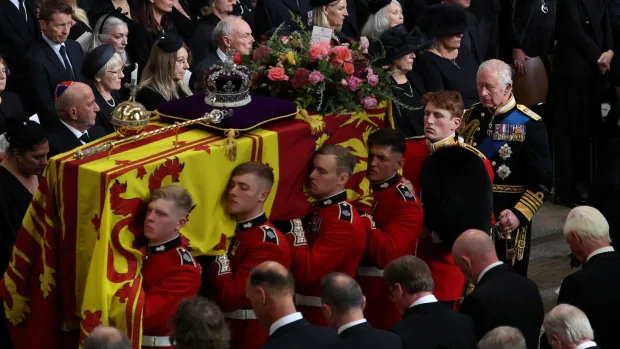The music during Queen Elizabeth’s funeral included songs that were played at her wedding to Prince Philip and her coronation, as well as specially commissioned works by U.K. composers, all paying tribute to her “remarkable reign,” according to a statement from Buckingham Palace.
The choirs of Westminster Abbey and the Chapel Royal of St James’s Palace, organists, state trumpeters and the Queen’s Piper performed during the service.
CBC News Network will rebroadcast the Queen’s funeral at 7 p.m. ET.
The palace has not yet said which songs were selected by the Queen herself, but provided details about the special meaning behind some of them.
Before the service officially began, organists played as more than 2,000 dignitaries gathered inside Westminster Abbey.
After pallbearers carrying the Queen’s casket arrived at the entrance to the abbey, the Westminster Abbey choir began singing the Sentences — five lines of scripture set to music by two of the abbey’s late organists from the 1600s and 1700s.
The two choirs sang the final two Sentences together as the casket was carried to the front of the abbey, with the Royal Family following behind. The Sentences has been used at every British state funeral since the early part of the 18th century, Buckingham Palace said.
After the Dean of Westminster gave The Bidding, including giving thanks for the Queen’s “life-long sense of duty and dedication,” all those gathered inside the abbey sang the first hymn, The Day Thou Gavest, Lord, Is Ended.
Specially composed pieces
It was followed by a reading by Commonwealth Secretary-General Patricia Scotland. The choir sang Like as the Hart, a setting of Psalm 42 to music specially commissioned for the funeral.
The music was written by British composer Judith Weir, who holds the title of Master of the King’s Music — a role within the Royal household in which she composes music at the monarch’s request. The song was inspired by Queen Elizabeth’s “unwavering Christian faith,” Buckingham Palace said.
British Prime Minister Liz Truss then gave a reading, after which attendees sang The Lord’s My Shepherd, a hymn that held special meaning for the Queen: it was sung at her wedding to Prince Philip in 1947.
Following a sermon by the Archbishop of Canterbury, the choir sang My Soul, There Is a Country, set by Hubert Parry, which the palace described as “an Anthem of great hope.”
After a series of prayers from other church leaders, the choir sang O Taste and See How Gracious the Lord Is, which was composed for Elizabeth’s coronation in 1953. It was followed by another hymn, Blaenwern, which was sung by attendees.
The Archbishop of Canterbury then gave a commendation, which was followed by another song specially commissioned for the funeral service. The song, Who Shall Separate Us?, set words from Romans 8 to new music written by Scottish composer James MacMillan. On Twitter, MacMillan said he was “deeply honoured” to be invited to write the song.
I was deeply honoured to be invited to write a new anthem ‘Who Shall Separate Us?’ for the funeral of Her Majesty Queen Elizabeth II. She was a constant presence in my life and an inspiration to countless millions across the globe. <a href=”https://t.co/opjUnumI6f”>https://t.co/opjUnumI6f</a>
—@jamesmacm
Just before the end of the funeral service, four trumpeters from the British Army’s Household Cavalry sounded The Last Post, which is often heard at military funerals or remembrance services. It was followed by two minutes of silence, before the trumpeters sounded The Reveille, which signals a service member rising above their mortal duties. (You can read more about The Last Post and Reveille, and their use in Canada, here.)
Attendees then sang the U.K. national anthem, God Save the King, before the Sovereign’s Piper of the Royal Regiment of Scotland played a traditional bagpipe lament, Sleep, Dearie, Sleep. The piper usually has the unique role of playing outside the sovereign’s window for 15 minutes each morning to awaken them.

As an organist played, the casket was carried from the abbey to begin its procession to the Queen’s final resting place at St. George’s Chapel at Windsor Castle.


